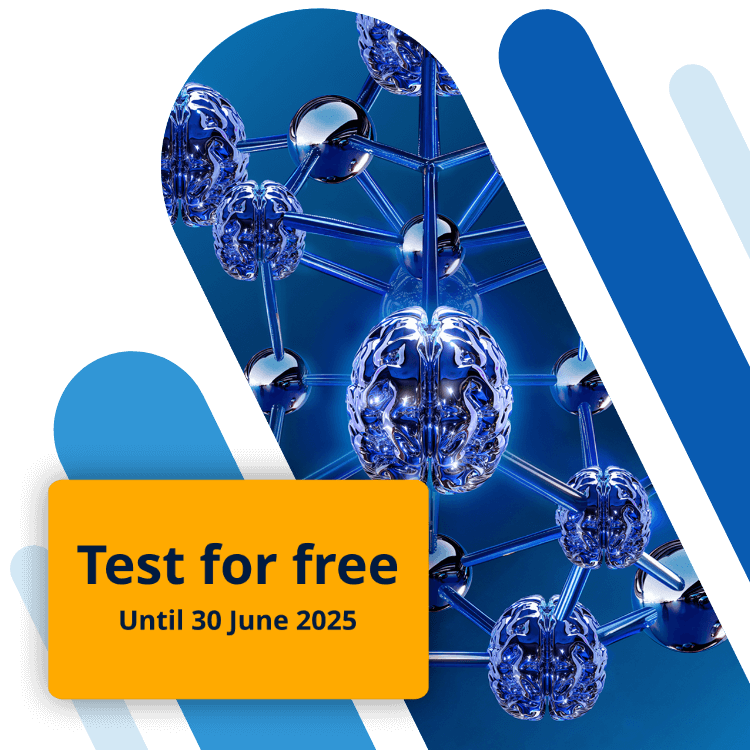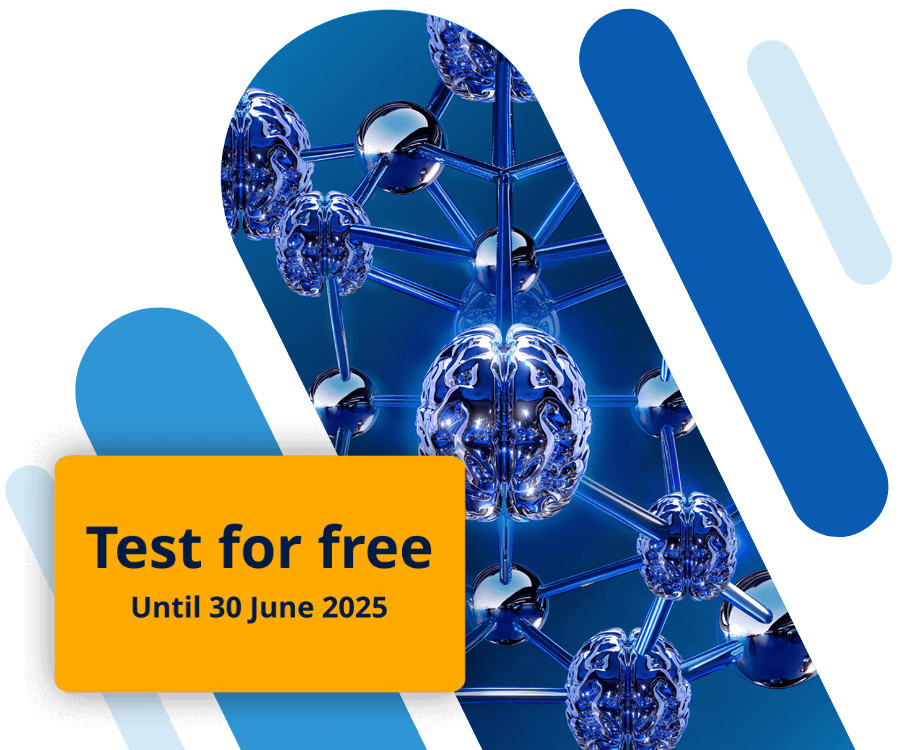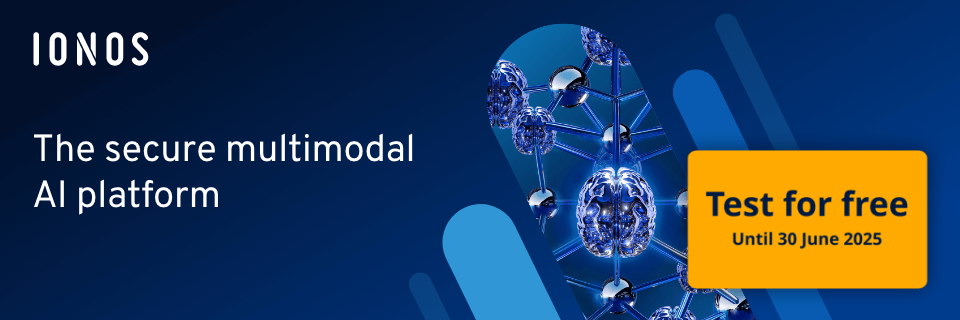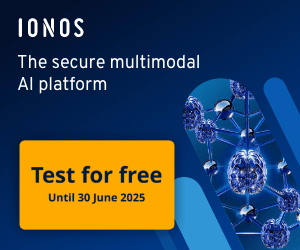What is AIOps (Artificial Intelligence for IT Operations)?
AIOps (Artificial Intelligence for IT Operations) refers to AI techniques and tools that automate essential IT tasks, such as performance and system monitoring, data backup, root cause analysis, reporting and workload planning. Using modern methods such as Machine Learning (ML) and Natural Language Processing (NLP), AIOps enhances the efficiency of your IT infrastructure, workflows and system integrity.
What is AIOps?
The term AIOps, short for Artificial Intelligence for IT Operations, was coined by the American market research company Gartner. AIOps encompasses a variety of tools and processes for optimising, automating and monitoring corporate IT infrastructure and digital workflows. Specifically, AIOps tools collect a variety of data, analyse it in real time and take actions to improve your IT operations. Here’s an overview of the tools and technologies used for AIOps:
- Artificial intelligence (AI)
- Machine Learning (ML)
- Analysis and processing of big data
- Natural Language Processing (NLP)
- AI Cloud
- Algorithms for event correlation and pattern recognition
- APIs for diverse data sources within IT infrastructures
- APIs for ticketing and alert systems
- Visualisation of the IT status
What tasks does AIOps perform?
Key tasks that AIOps fulfils for businesses include:
- Data management and performance monitoring: Large volumes of data from various sources, IT components, performance monitoring tools and service ticketing systems are captured, monitored and consolidated.
- Signal processing and event correlation: Important events, patterns and correlations are extracted from the collected data to identify performance and availability issues.
- Anomaly detection: By correlating and analysing various data, early warning signs of performance deviations can be detected to prevent disruptions or outages.
- Root cause diagnosis and automation: Causes of issues are identified and either reported immediately to IT and DevOps teams or resolved automatically.
- Capacity management and scalability: Based on usage patterns and performance analyses, resource needs can be forecasted, and the scalability of IT infrastructure and workflows can be optimised.
- Cloud transformation: AIOps tools offer the flexibility, efficiency, security and agility necessary for deploying and managing cloud applications, cloud migration and multi-cloud environments, while also accounting for numerous dependencies.
- Cost-effective vCPUs and powerful dedicated cores
- Flexibility with no minimum contract
- 24/7 expert support included
Why is AIOps important for businesses?
Integrating and automating multiple AIOps tools enables a rapid and proactive response to performance drops and operational interruptions. This ensures scalability and performance even in complex and dynamic IT environments. This also meets high user expectations for availability and performance and increases competitiveness. Many experts view AIOps as the future for businesses that focus on digital transformation and need to process and analyse increasing volumes of data.
Through faster problem detection and resolution, increased system availability and improved performance, businesses can gain significant competitive advantages. Additionally, AIOps supports the digitisation of IT processes, enhancing the agility and scalability of infrastructures, workloads and digital business processes.
What is AIOps used for?
Common use cases for AIOps (Artificial Intelligence for IT Operations) include the monitoring, optimisation, automation and stabilisation of networks, applications, workloads, cloud environments and physical elements. AIOps is especially beneficial for complex, agile and dynamic systems or environments with complex dependencies and large data volumes. For cloud-based microservice architectures or hybrid cloud environments, AIOps offers numerous advantages in terms of predictive analysis, workflow optimisation, data movement and performance monitoring.
AIOps also plays a crucial role in compliance enforcement and strengthening cyber resilience by enhancing protection against cyberattacks, implementing proactive cyber protection and setting up automated defense mechanisms. For DevOps teams, AIOps performs essential tasks to optimise code quality, such as automated code reviews and error detection.
- Get online faster with AI tools
- Fast-track growth with AI marketing
- Save time, maximise results
What are the benefits of AIOps tools?
The key benefits of AIOps include:
- Cost optimisation: AIOps lowers operational costs by efficiently analysing large data sets and supporting a small expert team. Automating routine tasks and precise problem resolution reduces the need for extensive manual interventions and minimises costly errors and disruptions. The result is improved resource utilisation, lower operating costs and higher customer satisfaction.
- Faster problem resolution: AIOps analyses real-time data and correlates events to quickly detect system anomalies. Using modern analysis tools and machine learning, the causes of issues can be quickly identified and resolved. Faster response times minimise downtime and maximise the availability of applications, services and systems.
- Increased efficiency in IT operations: AIOps aggregates information from various data sources into a central platform. This enables IT teams to work efficiently together and coordinate workflows without requiring constant human intervention. As a result, error sources are reduced, and productivity and efficiency in IT operations are improved.
- Proactive service management: AIOps enables predictive problem detection and resolution. AIOps tools analyse and identify patterns and trends that IT teams often have difficulty recognising due to data volume. Proactive actions reduce disruptions, close security gaps, respond to anomalies and increase the stability and reliability of IT services.
- Enhanced customer experience: By analysing customer interactions across communication channels like chat and email, you gain important insights into customer behaviour. Thanks to customer journey analysis, you can respond to customer needs in real time and adapt your services to meet expectations. Performance monitoring and incident management also prevent technical issues or incidents that may disrupt customer service. The result is a consistent and positive user experience that strengthens customer loyalty.
- Supporting cloud migration: For managing and monitoring public, private or hybrid cloud infrastructure, AIOps provides efficient automation and standardisation, even with complex dependencies. This optimises the monitoring of your cloud environment, including networks, storage solutions, and applications, and simplifies workload migration to the cloud.
- Rapid problem resolution: By filtering out noise and irrelevant signals, as well as event correlation and pattern recognition, you significantly reduce your MTTR (Mean Time to Resolution). This minimises downtime and increases availability and productivity.
- Proactive and predictive IT management: With AIOps, you no longer simply react to events and signals within your IT infrastructure, workloads and workflows but implement predictive and proactive processes.
How does AIOps work?
Implementing and applying AIOps tools works through several phases, including:
- Capture and Collect: Data capture and collection are among the most critical phases and elements of AIOps. The data to be captured includes system data, protocol and event data, application data, infrastructure, network data and logs and metrics.
- Observe and Predict: The capture and analysis of real-time data from various IT sources in one environment allows for early detection of trends, patterns and anomalies. Predictive analyses ensure proactive action and appropriate capacity and resource planning.
- Bind and Prevent: The integration of human experts alongside AIOps analyses optimises IT workload coordination and enhances diagnostics through shared dashboards and real-time notifications.
- Act and Automate: By automating and standardising workflows, techniques and methods based on AIOps analyses, you can achieve long-term improvements for your IT infrastructure that are sustainable. This optimises operational processes, relieves your teams, reduces costs and increases competitiveness through greater flexibility, agility, and scalability.
What types of AIOps solutions are there?
AIOps solutions can generally be divided into two types: domain-specific and domain-agnostic solutions.
Domain-specific AIOps
These are specialised AI-driven tools. Their tasks are focused on specific domains in the IT infrastructure, such as network monitoring, application monitoring or cloud computing.
Domain-agnostic AIOps
Domain-agnostic AIOps tools are used across networks and enterprises for predictive analysis, automation, scalability and process optimisation. They gather data from multiple sources, providing comprehensive insights into IT operations through pattern recognition, trend analysis and event correlation.



